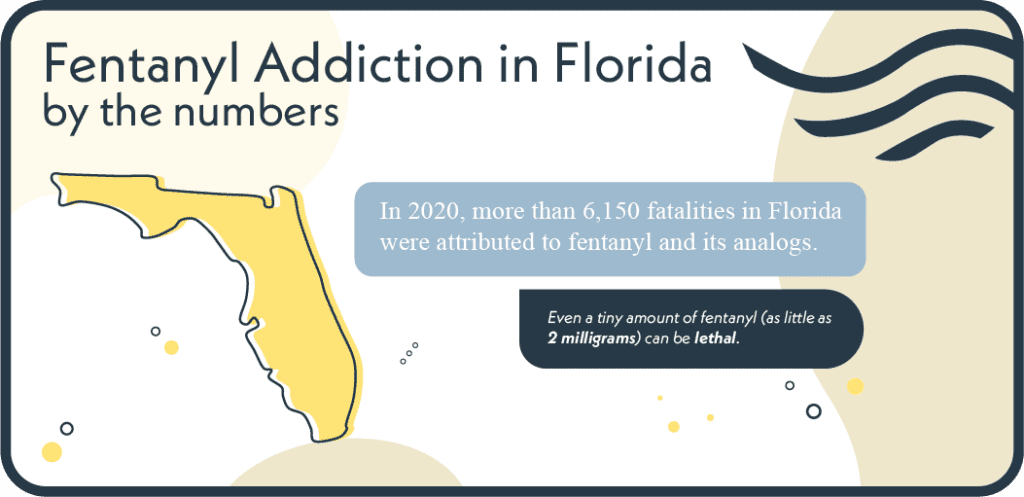Clinically reviewed by Dr. David Kashan, MD – Chief Medical Director
Fentanyl Detoxification Program in Florida

Fentanyl has caused quite a stir not only in the United States, but in Florida. There are many individuals getting hooked on the substance, overdosing, and diminishing their quality of life altogether because of it. Luckily, Evoke Wellness in Florida is here to help. We understand that it’s not easy to seek out treatment; it’s a scary process with a plethora of unknown variables. However, those who walk through the doors of our facilities in Florida can rest assured that we exist to tailor-fit treatment options to their unique needs. If you or a loved one would like to find out more about our fentanyl detox program in Florida, you can call us at (866) 931-9312.
Fentanyl Addiction Program
Fentanyl has become a household name in recent years, cutting countless lives short through its potent nature and its being present in many street drugs. While used for medical purposes ranging from surgery to terminal illness, it can quickly become an addictive substance.
If you or someone you love is suffering from Fentanyl addiction, it’s important to find an opioid addiction treatment program near you. Evoke Wellness at Miramar has a wide range of treatments, including detox. Contact us today to learn more.
What is Fentanyl?
Fentanyl is a powerful synthetic opioid that is primarily used in medical settings to manage severe pain, especially after surgery or for patients with chronic pain, such as those with cancer. It works by binding to opioid receptors in the brain, which helps alleviate pain but also produces feelings of euphoria. While it has legitimate medical uses, fentanyl is extremely potent—50 to 100 times stronger than morphine—making it highly dangerous when misused. Illicit fentanyl, often mixed with other drugs like heroin or cocaine, has contributed to a significant increase in overdose deaths due to its potency and the ease with which it can cause a fatal overdose.
The opioid crisis that began in 2007 increased significantly in 2013 when illegal Fentanyl became a popular drug to cut heroin for the sole purpose of creating a more potent product that was cheaper. The nationwide opioid epidemic is now facing an unprecedented number of accidental overdoses due to the Fentanyl drug mixtures being sold on the street.
Is Fentanyl Dangerous?
Fentanyl is extremely dangerous due to its potency. It is a synthetic opioid that is 50 to 100 times stronger than morphine and can be lethal even in small amounts. Fentanyl is often mixed with other drugs, such as heroin or cocaine, without the user’s knowledge, increasing the risk of overdose. Just a few milligrams of fentanyl can cause respiratory depression, which may lead to death if not treated promptly. The drug is highly addictive, and its misuse has contributed significantly to the ongoing opioid crisis, leading to a dramatic increase in overdose deaths.
If you're ready to start your journey to recovery, we're here to help.
Fentanyl Detox and Treatment in Florida
The first step in overcoming Fentanyl addiction is to detox from the drug. This can be done through a medical detox program that will help to manage withdrawal symptoms and make the process as safe and comfortable as possible. After detox, it is essential to seek treatment at a Fentanyl rehab center that can provide the comprehensive care necessary for long-term recovery.
Treatment should focus on the underlying causes of addiction and help the addict to develop healthy coping skills and a solid support system. With the right treatment, it is possible to overcome Fentanyl addiction and go on to lead a happy and fulfilling life.
Some aspects of overcoming addiction include:
- Identifying the reasons why you started using Fentanyl in the first place
- Learning how to cope with stress and triggers without turning to drugs
- Building a support system of family and friends who can help you through tough times
- Attending therapy to work on any underlying mental health issues
- Participating in group counseling to share your experience with others who are going through the same thing
If you or someone you know is struggling with Fentanyl addiction, don’t wait to get help. Detox and treatment can be the first step on the road to recovery.

Our Fentanyl Detox Program at Evoke Wellness in Florida
To help Fentanyl addicts get clean from Fentanyl or other opiates cut with Fentanyl, they must be admitted into an opiate detox program specializing in Fentanyl addiction. Fentanyl, like other potent opiates, requires that a person be prescribed safe medications to help them tolerate the physical, emotional, and mental withdrawal symptoms. Our medically supervised detox program provides medications that minimize and reverse Fentanyl withdrawal symptoms. We prescribe Fentanyl detoxification medications, including buprenorphine, methadone, anti-anxiety medications, and other prescription drugs to reduce insomnia and flu-like symptoms.
Evoke Wellness at Miramar fentanyl detox center is overseen by medical doctors specializing in opiate and Fentanyl addiction. Each client is carefully monitored around the clock. Our professional detox staff members include psychiatrists, substance abuse counselors, and mental health therapists who assess the clients regularly. Our clinical team in the detox unit has years of experience helping addicts detox from opiates and continue into recovery. Part of the detoxification program is introducing and encouraging the clients to remain for a Fentanyl addiction treatment program.
The first step towards freedom from Fentanyl addiction is to detox. The next step is to complete a drug treatment program specific to the addiction. Our opiate addiction treatment programs hold outstanding success rates in helping Fentanyl, heroin and other opiate drug addicts get and remain clean for good.
Find Fentanyl Detox Near Me in Florida
At Evoke Wellness in Miramar, Florida, we understand the challenges of overcoming fentanyl addiction, and we’re here to support you every step of the way. Our fentanyl detox program is designed to provide a safe and comfortable environment for individuals seeking recovery. Located in the heart of Florida, our facility offers comprehensive detox services, with medical supervision and personalized care tailored to your needs. We utilize evidence-based treatment methods to help you manage withdrawal symptoms and set the foundation for long-term recovery. If you’re looking for fentanyl detox near you, Evoke Wellness is ready to assist you on your journey to a healthier, drug-free life. Reach out to our team today to take the first step toward recovery.
- Evoke Wellness: 3600 Red Rd, Miramar, FL 33025
What is the Admissions Process for Fentanyl Detox at Evoke in Florida?
At Evoke Wellness in Florida, we’ve designed our admissions process for fentanyl detox to be as smooth and supportive as possible. When you reach out to us, our compassionate admissions team will guide you through the necessary steps. First, we’ll conduct a thorough assessment to understand your specific needs and medical history, ensuring that we provide the most effective and personalized care. This includes evaluating the severity of your fentanyl use, any underlying health conditions, and your overall detox readiness.
After initial assessment, we’ll discuss your treatment options and create a customized detox plan that is both safe and effective. Our team will also provide you with information on insurance and payment options to ensure a seamless experience. At Evoke Wellness, we prioritize your well-being and are committed to supporting you through every step of the detox process, offering a nurturing and non-judgmental environment for your recovery.
Fentanyl and Fentanyl Addiction in Florida: Facts and Statistics
FL Health Charts. “Substance Use Dashboard: Overdoses.” flhealthcharts.gov, 2024, https://www.flhealthcharts.gov/ChartsDashboards/rdPage.aspx?rdReport=SubstanceUse.Overdose.
FL Health Charts. “Substance Use Dashboard: Overdoses.” flhealthcharts.gov, 2024, https://www.flhealthcharts.gov/ChartsDashboards/rdPage.aspx?rdReport=SubstanceUse.Overdose.
Florida Department of Health. “Public Safety Alert: Fentanyl Kills.” floridahealth.gov, https://www.floridahealth.gov/programs-and-services/prevention/substance-abuse/_documents/Fentanyl_Poster_FDOH_DCF.pdf.
Florida Department of Health. “Florida Drug Overdose Surveillance and Epidemiology (FL-DOSE).” floridahealth.gov, 13 Mar 2024, https://www.floridahealth.gov/statistics-and-data/fl-dose/index.html.
How Much Does Fentanyl Addiction Treatment Cost in Florida?
At Evoke Wellness in Florida, we understand that the cost of fentanyl addiction treatment is an important consideration for many individuals and families seeking help. The price of treatment can vary depending on the level of care you need, the duration of your program, and any additional services required. Our detox programs, which are medically supervised and tailored to your specific needs, typically range in cost based on these factors.
We work with most major insurance providers to help make treatment more affordable and can assist you in verifying your coverage. For those without insurance or who may need financial assistance, we offer flexible payment options to ensure you have access to the care you need. At Evoke Wellness, our priority is to support you on your path to recovery, and we are committed to making treatment as accessible and effective as possible.
Can Fentanyl Addiction Treatment be Covered by Insurance in Florida?
Fentanyl addiction treatment can often be covered by insurance in Florida. Many insurance plans, including private insurance and Medicaid, offer coverage for drug addiction treatment, including medically supervised detox and rehabilitation programs. At Evoke Wellness, we work with most major insurance providers to help make your treatment more affordable. Our team can assist with verifying your insurance coverage to determine what services are included, such as detox, therapy, and aftercare support.
We also understand that financial concerns can be a barrier to treatment; this is why we offer flexible payment options for those who may not have full insurance coverage. Our goal is to ensure that you receive the care you need to begin your recovery journey, regardless of your insurance situation.
If you're ready to start your journey to recovery, we're here to help.
Get Help for Fentanyl Addiction Today - Contact Evoke Wellness in Florida
Fentanyl addiction is a tough hand to be dealt. Chances are, you didn’t ask to become addicted. At Evoke Wellness, we want to help by walking alongside you in your journey to recovery. If you’re interested in finding out more, you can contact us here; you can also call us at (866) 931-9312.

